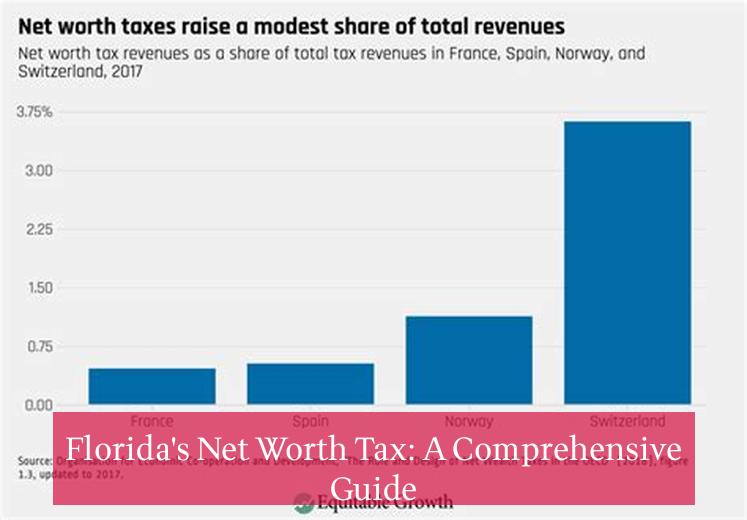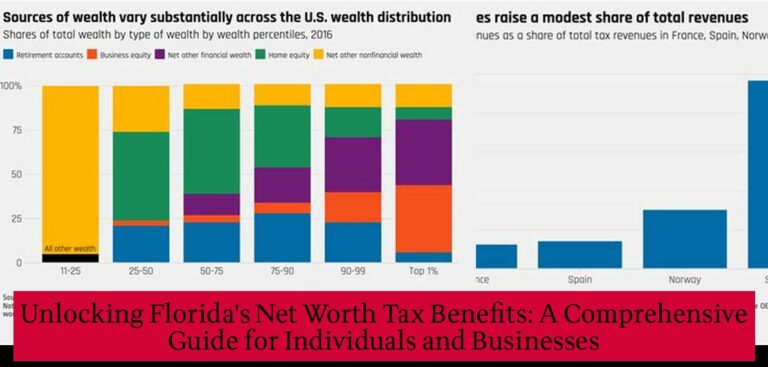Unlock the secrets to tax heaven in the Sunshine State with our comprehensive guide to Florida’s net worth tax. Discover how Florida’s absence of personal income tax lures individuals seeking financial freedom, and explore the wealth management benefits and tax exemptions that make this state a haven for retirement income and investments. From the demise of the intangible personal property tax to the contrasting corporate income tax landscape, we’ll unravel the tax advantages that make Florida a top choice for those looking to maximize their wealth. So, grab your sunglasses and join us as we explore the tax-friendly environment of Florida!
Key Takeaways
- Florida does not collect personal income tax, making it a popular state for retirees and tax-averse workers.
- Residents of Florida benefit from tax-free pensions, retirement pay, and no state taxes on Social Security or investment income.
- There is no state income tax in Florida, and no Florida cities charge a local income tax.
- Florida also does not have an inheritance or estate tax, making it an attractive state for estate planning and wealth management.
- Corporations that do business in Florida are subject to a 5.5% income tax, while LLCs, sole proprietorships, and S corporations are exempt from paying state income tax.
- Florida’s intangible personal property tax, which was an annual tax on intangible assets, such as stocks, bonds, and mutual funds, was repealed in 2007.
Florida’s Net Worth Tax: A Comprehensive Guide

Key Takeaways
Florida is one of the few states in the US that does not impose a personal income tax, making it an attractive destination for retirees and those looking to reduce their tax burden. This tax-friendly environment extends to pensions, retirement pay, Social Security benefits, and investment income, which are all exempt from state taxation. Additionally, Florida has no inheritance or estate tax, making it an ideal location for estate planning and wealth management. While corporations operating in Florida are subject to a 5.5% income tax, LLCs, sole proprietorships, and S corporations are exempt from this levy.
>> Kevin Watson’s Net Worth Revealed: The Truth Behind I Love New York Star’s Financial Success
The Absence of Personal Income Tax: A Major Draw for Individuals
Florida’s lack of personal income tax is a significant advantage for individuals, particularly those in retirement. Retirees can enjoy their pensions and retirement savings without having to pay state income tax, allowing them to stretch their retirement funds further. Similarly, those relocating from states with high income taxes may find Florida’s tax-free environment highly appealing. The absence of a state income tax also eliminates the need for complex tax filings, saving individuals time and money.
Tax Exemptions for Retirement Income and Investments
Florida’s tax-friendly policies extend to retirement income and investments. Pensions and retirement pay are exempt from state income tax, providing retirees with a secure and tax-free source of income. Social Security benefits are also not subject to state taxation, further enhancing the financial well-being of retirees. Investment income, such as dividends and capital gains, is also exempt from state income tax, making Florida an attractive destination for investors seeking to maximize their returns.
Estate Planning and Wealth Management Benefits
Florida’s lack of inheritance or estate tax provides significant advantages for estate planning and wealth management. Individuals can pass on their assets to their heirs without incurring state-level inheritance or estate taxes, ensuring a smooth and tax-efficient transfer of wealth. This tax-friendly environment makes Florida an ideal location for individuals seeking to preserve their wealth and minimize the tax burden on their beneficiaries.
Corporate Income Tax: A Different Story for Businesses
While individuals benefit from Florida’s lack of personal income tax, corporations operating in the state are subject to a 5.5% income tax. This tax is imposed on all corporations, regardless of their size or industry. However, LLCs, sole proprietorships, and S corporations are exempt from this tax, providing small business owners with a significant tax advantage.
Florida’s Intangible Personal Property Tax: A Thing of the Past
Florida’s intangible personal property tax, which was an annual tax on intangible assets such as stocks, bonds, and mutual funds, was repealed in 2007. This repeal provides significant tax savings for individuals and businesses holding intangible assets, making Florida an even more attractive location for investment and wealth management.
Florida’s Tax Advantages: A Summary
Florida’s tax system offers numerous advantages for individuals and businesses alike. The lack of personal income tax, combined with tax exemptions for retirement income, investments, and intangible assets, makes Florida an ideal location for retirees, investors, and those seeking to minimize their tax burden. While corporations are subject to a 5.5% income tax, LLCs, sole proprietorships, and S corporations are exempt, providing small business owners with a significant tax advantage. Overall, Florida’s tax-friendly environment is a major draw for individuals and businesses seeking to maximize their financial well-being.
More related > Mansion Benny Hinn Net Worth: Unveiling the Financial Empire and Controversial Lifestyle of the Televangelist
Additional Considerations: Local Taxes and Sales Tax
While Florida does not have a personal income tax, some local governments may impose their own taxes. It is important to research local tax rates and regulations before making a decision about relocating to a particular area in Florida. Additionally, Florida has a 6% sales tax, which is applied to most goods and services. This sales tax rate is relatively low compared to other states, but it is important to factor in when considering the overall cost of living in Florida.
Conclusion: Florida’s Tax-Friendly Environment
Florida’s tax system is designed to attract and retain individuals and businesses. The lack of personal income tax, combined with tax exemptions for retirement income, investments, and intangible assets, makes Florida an ideal location for those seeking to minimize their tax burden. While corporations are subject to a 5.5% income tax, LLCs, sole proprietorships, and S corporations are exempt, providing small business owners with a significant tax advantage. Overall, Florida’s tax-friendly environment is a major draw for individuals and businesses seeking to maximize their financial well-being.
Does Florida have a net worth tax?
Florida does not have a net worth tax. It is one of just seven states that do not collect personal income tax, allowing residents to benefit from tax-free pensions and retirement pay, along with no state taxes on Social Security or investment income.
What are the taxes on $1,000,000 in Florida?
If you make $1,000,000 a year living in Florida, you will be taxed $358,978. This means that your net pay will be $641,023 per year, or $53,419 per month. The average tax rate is 35.9%, and the marginal tax rate is 39.4%.
What is the net income tax in Florida?
Florida has no state income tax, making it a popular state for retirees and tax-averse workers. If you’re moving to Florida from a state that levies an income tax, you’ll get a pleasant surprise when you see your first paycheck. Additionally, no Florida cities charge a local income tax.
How much is $100,000 taxed in Florida?
If you make $100,000 a year living in Florida, you will be taxed $22,418. This means that your net pay will be $77,582 per year, or $6,465 per month.
What is the Florida corporate income tax rate?
The Florida corporate income tax is imposed on all corporations for the privilege of conducting business, deriving income from Florida, or existing as a corporation in Florida. Corporations that do business in Florida are subject to a 5.5% income tax, while LLCs, sole proprietorships, and S corporations are exempt from paying state income tax.
